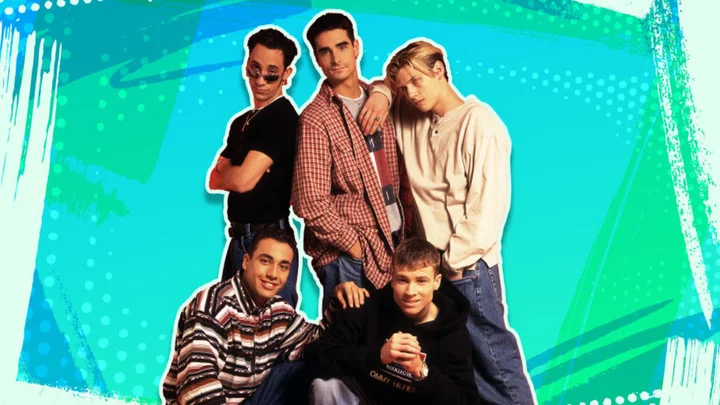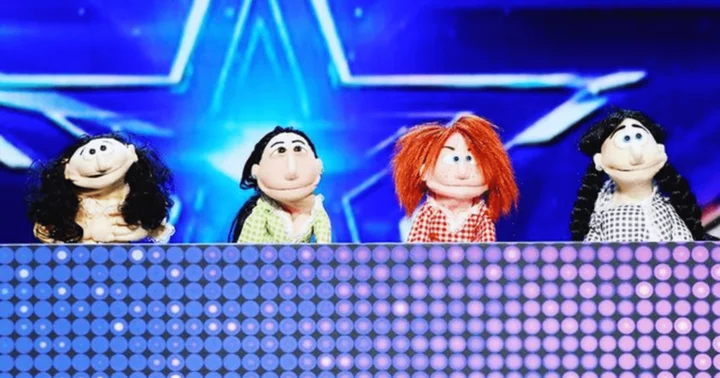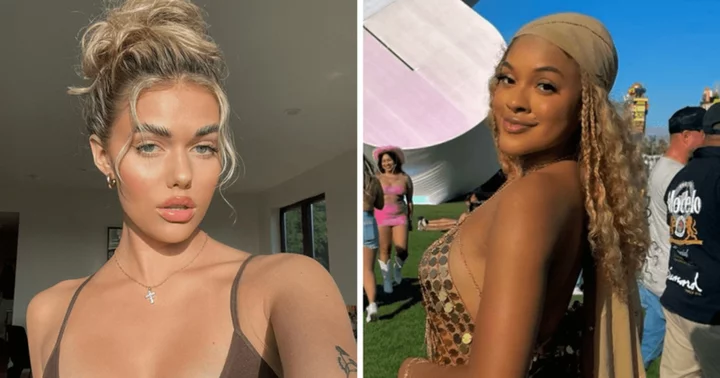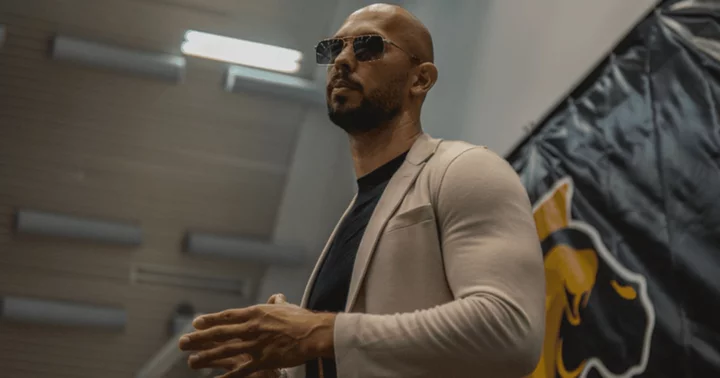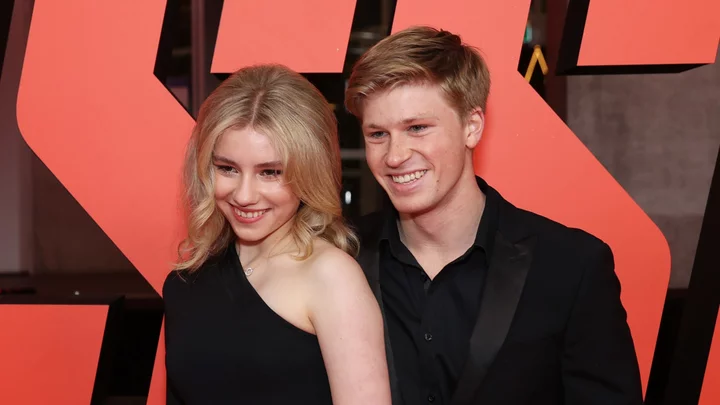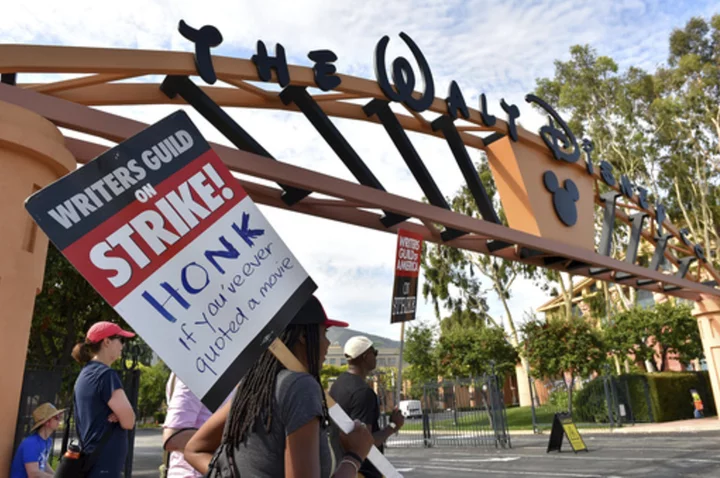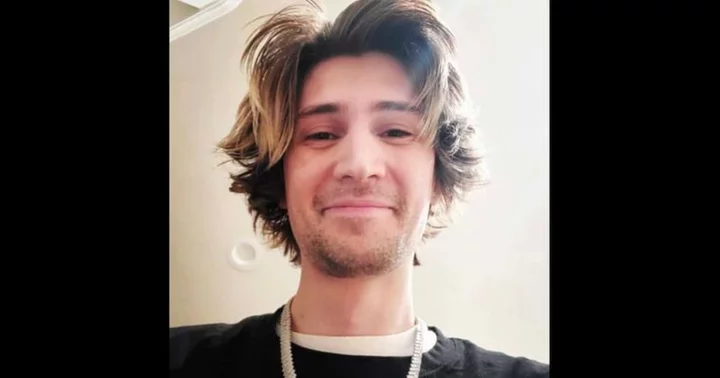Musically, it’s neither a grand romantic ballad nor a propulsive dance banger, and lyrically, it’s semi-coherent at best. Technically, it’s not even the group’s highest-charting U.S. single. And yet, the Backstreet Boys’ 1999 smash “I Want It That Way,” which celebrates its 25th anniversary in April 2024, is among the definitive songs—if not the definitive song—of the ’90s teen-pop explosion.
More than just a sign of the times, “I Want It That Way” is a ridiculously catchy, expertly crafted piece of music that transcends eras and defies criticism. When it comes on the radio, everyone in the car sings along—period.
“I Want It That Way” is largely the handiwork of Swedish songwriter and producer Max Martin, a melodic genius who has penned hits for everyone from NSYNC to The Weeknd—and who’s arguably done more than anyone to shape the sound of popular music over the last quarter-century. The story of how the song and its iconic music video came together is filled with little twists and strange artistic choices that make it seem like the universe wanted “I Want It That Way” to happen. And you really can’t blame the universe.
Orlando Origins
To fully appreciate the significance of “I Want It That Way,” one must first know some Backstreet Boys history. The quintessential ’90s American boy band comprises A.J. McLean, Howie Dorough, Nick Carter, and cousins Kevin Richardson and Brian Littrell. They came together in Orlando, Florida, in 1993, after a secretly shady (more on that later) blimp magnate named Lou Pearlman placed an ad in the Orlando Sentinel. Pearlman was looking to start a group like New Kids on the Block, who’d achieved massive success earlier in the decade, and soon, his photogenic fivesome had signed a deal with Jive Records. Their name derives from the Backstreet Market, an outdoor flea market in Orlando.
When the Backstreet Boys debuted in 1995, America wasn’t quite ready for a teen-pop takeover. Their debut single, “We Got It Goin’ On,” went no higher than No. 69 on the Billboard Hot 100. Over in Europe, however, it became a bonafide smash, reaching the Top 10 in numerous countries. The group’s 1996 self-titled debut album didn’t even come out in America, but it topped the charts in places like Austria, Germany, and Switzerland.
On August 12, 1997, America finally got its own version of Backstreet Boys. It contains songs from the international edition of the album and its follow-up, Backstreet’s Back, which came out globally (though not in the U.S.) on August 11, 1997. The singles “Quit Playing Games (With My Heart)” and “All I Have to Give” cracked the Top 5 of the Billboard Hot 100—the former peaking at a career-best No. 2—and by August 31, 1998, the album had gone sextuple platinum. (It was certified 14x platinum in April 2001.)
Seven years after Nirvana had instigated the angsty grunge rebellion with 1991’s “Smells Like Teen Spirit,” a new revolution was underway. This time, it would be clean-cut model-types and former Mouseketeers leading the charge, presenting America’s youth with a decidedly peppier vision of adolescence.
Melodies to the Max
Two of the biggest songs on the American edition of Backstreet Boys, “Quit Playing Games (With My Heart)” and “As Long As You Love Me,” were written or co-written by one Karl Martin Sandberg, a.k.a. Max Martin. A product of Sweden’s famed state-sponsored music education programs, Martin started off playing the recorder before graduating to French horn, drums, and keyboards.
In addition to being an ace musician, Martin was a huge music fan. Growing up in suburban Stockholm in the ’70s and early ’80s, Martin absorbed his parents’ records—the Beatles, Elton John, Vivaldi—before latching onto theatrical hard rockers Kiss, whom he discovered through his older brother. In the mid-’80s, Martin began fronting the glam-metal outfit It’s Alive. When he wasn’t rocking out with the band, he was sneaking listens to pop songs like The Bangles’s “Eternal Flame,” a harbinger of things to come.
Martin’s life changed in 1994, when he met producer Dag Krister Volle, otherwise known as Denniz PoP. As co-founder of the now-legendary Cheiron Studios in Stockholm, PoP had produced a string of memorable hits for the Swedish electro-pop foursome Ace of Base. PoP became Martin’s mentor and gave him his stage name. Whereas PoP was an untrained musician who trusted his gut, Martin had a deep knowledge of music theory. He was able to synthesize new sounds and textures into funky, hooky music that left his collaborators floored. PoP and Martin co-wrote and co-produced “We’ve Got It Goin’ On,” Backstreet Boys’s debut single.
Around the same time of those early Backstreet Boys hits, the world received another Max Martin pop gem, “...Baby One More Time,” the 1998 debut single by a then-unknown Louisiana hopeful named Britney Spears. Written and co-produced by Martin, that song topped the Billboard Hot 100 and shook the Earth off its axis. Teen pop had fully arrived.
“Abstract” Lyrics
Despite their heightened profile, Backstreet Boys didn’t have an easy road to their third album (second in America), 1999’s Millennium. In 1998, four of the five members sued Lou Pearlman; among the issues was the accusation that Pearlman pocketed $10 million from a European tour, while they’d only made $300,000. After a court case that involved 20 judges and lawyers spread across three states, they wound up settling in October 1998 (the terms were not disclosed). That same year, BSB member Brian Littrell underwent surgery to fix a hole in his heart.
Amid all this drama, Backstreet Boys hit the studio in the fall of 1998 and started work on Millennium, an album that would be loaded with songs written and produced by Martin and his Cheiron collaborators. (PoP was not among them—he died of cancer in August 1998 at age 35.) Among them was a mid-tempo number called “I Want It That Way.” Martin wrote it with help from Andreas Carlsson, a relative newcomer at Cheiron who’d given up his pop-star dreams after opening for Backstreet Boys in Sweden in 1996.
“All I understood after that was that I was a waste of time as an artist—because they were so good!” Carlsson told Billboard.
Martin came up with the bulk of “I Want It That Way” himself. He had the opening line, “You are my fire/The one desire,” but he enlisted Carlsson—whom he’d recently discovered was his next door neighbor—to help him complete the lyrics. They tried a “million different variations” for the second verse, Carlsson told HitQuarters, before they ultimately used the “fire/desire” rhyme again, albeit with a slight tweak: “Am I your fire / Your one desire?”
They capped the song off with a guitar lick that, according to numerous online sources, was inspired by Metallica’s “Nothing Else Matters.” (Remember: Martin was a metal guy.) When it was finished, everyone loved it. There was just one little problem.
“The band and the record company heard it and they immediately said, ‘This is a classic,’” Carlsson told Billboard. “But they weren’t sure about the lyrics because they thought they were too abstract—and rightfully so!”
“Abstract” is a nice way of putting it. “I Want It That Way” is sung from the perspective of a guy who doesn’t want to break up with his significant other. He begins by telling this person they’re his “fire” and “one desire.” “Believe me when I say/I want it that way,” he adds. Simple enough so far. But then comes this section:
“But we are two worlds apart
Can’t reach to your heart
When you say
That I want it that way”
Those lines are confusing unless you throw quotation marks around the phrase I want it that way, thereby indicating that the narrator’s love interest is the one saying those words. It’s worth noting that there are no quotation marks in the lyrics printed in the original CD booklet, so it’s unclear whether Martin and Carlsson intended them to be there. But quotation marks around I want it that way would also come in handy on the chorus:
“Tell me why
Ain’t nothin’ but a heartache
Tell me why
Ain’t nothing but a mistake
Tell me why
I never wanna hear you say
I want it that way”
With quotation marks, this reads like the narrator telling his partner that he never wants to hear them say that this relationship is a heartache and a mistake. (Though even if you add quotation marks, the lyrics are pretty confusing—people aren’t wrong to scratch their heads.) The Backstreet Boys themselves seemed to support this interpretation when they responded to a tweet from Chrissy Teigen in 2018. Teigen was puzzled by the lyrics that end the song—“I never wanna hear you say/I want it that way/Cause I want it that way.” In particular, she wanted to know what “it” means—and BSB offered this response: “Don’t wanna hear you say that you want heartaches and mistakes... or to be 2 worlds apart. We don’t want you to want ‘it’ that way - that’s the way we want it... for you to not want it that way.”
This wasn’t the first time the Backstreet Boys had weighed in on the song’s cryptic lyrics. “Ultimately the song really doesn't really make much sense,” BSB member Kevin Richardson told LA Weekly in 2011. Richardson chalked it up to Martin’s limited command of the English language. “His English has gotten much better,” he said, “but at the time …”
Melodic Math
Martin’s limited English skills might have actually been a blessing. In a 2015 article for The New Yorker, John Seabrook argues that Swedish songwriters like Martin are liberated from the demands of having to be witty and clever. Instead, they can focus on what Martin has called “melodic math,” the notion that words should function mostly in service of a song’s melody. The hook is everything—meaning is secondary.
“I Want It That Way” is far from the only example of questionable English in Martin’s oeuvre. When he wrote the line “Hit me, baby, one more time” for Britney Spears’s breakthrough, he thought hit was slang for call, and that the line meant “call me one more time.” But people didn’t get it. As Seabrook puts it, “It was hard to imagine that anyone for whom English is a first language would write the phrase ‘Hit me, baby’ without intending it as an allusion to domestic violence or S & M. That was the furthest thing from the minds of the gentle Swedes, who were only trying to use up-to-the-minute lingo.”
Martin originally offered the song to TLC, and they turned it down partially due to that lyric. “I was like, I like the song but do I think it’s a hit? Do I think it’s TLC?” group member T-Boz told MTV. “I'm not saying ‘hit me baby.’ No disrespect to Britney. It's good for her. But was I going to say ‘hit me baby one more time'? Hell no!”
Justin Timberlake was more accommodating when Martin asked him to pronounce the word me as “may” on the 2000 *NSYNC smash “It’s Gonna Be Me.” “I don’t remember if the specifics were a ‘meaner me,’ but I sang, ‘It’s gonna be me,’ and he was like, ‘No, no, no, no, no, no,’” Timberlake said on the YouTube series Hot Ones. “He was like, ‘It’s may.’ … The parts of their English that were broken actually made them catchier songwriters because they would put words a way that almost didn’t make sense, but when you sang them, they were more memorable.”
Slightly more recently, Martin made headlines for the grammatical liberties he took in writing Ariana Grande’s 2014 song “Break Free,” featuring Zedd. Martin’s lyrics required Grande to sing lines like “Now that I’ve become who I really are” and “I only wanna die alive,” and that didn’t sit right with the pop star.
“I fought [Martin] on it the whole time,” Grande told TIME magazine. “‘I am not going to sing a grammatically incorrect lyric, help me God!’ Max was like, ‘It’s funny—just do it!’ I know it’s funny and silly, but grammatically incorrect things make me cringe sometimes.” She sang the lyrics as written anyway, and the song peaked at No. 4 on the Billboard Hot 100.
“No Goodbyes”
Jive ultimately released “I Want It That Way” with Martin’s convoluted lyrics, but only after the label commissioned an alternate version co-written by South African superproducer and songwriter Robert John “Mutt” Lange, the man behind hits for Def Leppard, AC/DC, and Shania Twain.
Now known as “No Goodbyes” by Backstreet Boys superfans, the alternate version includes the following chorus, which completely flips the meaning of the original. (It could also use quotation marks around “I want it that way,” but maybe that’s nitpicking.)
“No goodbyes
Ain’t nothing but a heartache
No more lies
Ain’t nothing but a mistake
That is why
I love it when I hear you say
I want it that way”
So why isn’t this the version that’s burned into the brain of every ’90s kid on the planet? The Backstreet Boys vetoed the rewrite and stuck with Martin and Carlsson’s lyrics. “I don’t think that it would have ended up the way that it did had we gone with the proper version,” McLean told HuffPost. “I guess you could say, you know, the one that made sense.”
“Sometimes you overthink things,” Richardson said. “I think the newer version or the second version that we did that was more of a literal context didn’t ... it was the rhyming scheme that didn’t feel right. Yeah, it just didn’t feel as good, so sometimes you just got to go with what feels right.”
Richardson believes that “I Want It That Way” makes perfect sense to most fans, since “everyone interprets lyrics differently and every song moves people differently.” The song certainly spoke to people somehow. Released as the lead single off Millennium, “I Want It That Way” reached No. 1 on Billboard’s Adult Contemporary, Mainstream Top 40, and Top 40 Tracks charts. It stalled at No. 6 on the Billboard Hot 100, but only because no physical CD single was available for purchase. Millennium debuted at No. 1 on the Billboard 200, and the 1.1 million copies it sold in its first week broke a record previously held by Garth Brooks.
Dancing at LAX
Upon hearing “I Want It That Way,” anyone old enough to remember MTV’s TRL will naturally picture the music video, which features the group dancing in all-white outfits in an airport terminal and serenading fans on a tarmac. The Backstreet Boys shot the clip at Los Angeles International Airport, and according to McLean, it was the “first and only time” such a thing was allowed, as the tragedies of 9/11 a couple years later made filming at airports impossible.
While the costumes and choreography would become iconic—pop-punkers Blink-182 famously lampooned the video in their “All the Small Things” music video—none of the Backstreet Boys were particularly impressed at the time.
“I just remember having to film the music video in between doing a lot of stuff,” Carter told Us Weekly in 2017. “I don’t remember traveling but I remember coming in and working up a choreography routine at the last minute. I think we felt that it was super cheesy and it was something that was unnecessary. It was kind of like we didn’t want to do it.”
Legacy of a Bop
In 2012, Rolling Stone readers voted Backstreet Boys the No. 1 boy band of all time, and the accompanying article refers to “I Want It That Way” as a “genre-transcending classic.” VH1 ranked “I Want It That Way” as the No. 3 song of the ’90s, right behind Nirvana’s “Smells Like Teen Spirit” and U2’s “One.” “I Want It That Way” has been covered by everyone from goofy ’80s hair-metal revivalists Steel Panther to ’70s-era psych rockers Vanilla Fudge to YouTuber Billy Cobb, who created a popular emo version.
“I Want It That Way” has also appeared in commercials for Geico, Chipotle, Downey, and Doritos—the latter was a high-profile Super Bowl spot starring Chance the Rapper, who gave the song a hip-hop update. All the while, fans have continued listening to the original. In November 2021, the “I Want It That Way” music video reached a billion views on YouTube.
As of 2023, Backstreet Boys are still together. They’ve released seven albums (not counting compilations) since Millennium, the most recent being 2022’s A Very Backstreet Christmas. That collection of holiday tunes includes a cover of Wham!’s “Last Christmas” that reached No. 1 on Billboard’s Adult Contemporary chart. The group was set to star in an ABC special titled A Very Backstreet Holiday in December 2022, but those plans were scrapped due to rape allegations against Nick Carter. Carter has denied the claims, and earlier this year, he filed a defamation suit against another rape accuser.
Legal troubles also haunt the legacy of Lou Pearlman. It turns out he was running a massive Ponzi scheme that he used to steal more than $317 million from investors, many of whom were retirees. (Some former associates have also accused Pearlman of sexual misconduct.) After fleeing the U.S., Pearlman was arrested in Indonesia in 2007. He pleaded guilty to conspiracy, money laundering, and making a false claim in a bankruptcy, and he was sentenced to 25 years behind bars. He died of a heart infection in 2016 at the age of 62.
The biggest winner of this story is Max Martin, who has remained pop’s go-to collaborator and reigning chart champion for decades. In the last 10 years alone, he’s written and produced blockbuster singles for Katy Perry, Taylor Swift, The Weeknd, and Ariana Grande, among many, many others. The man has more than two dozen No. 1 pop hits to his credit, including “My Universe,” Coldplay’s 2021 team-up with the K-pop band BTS. Martin’s list of chart-toppers contains bangers galore, but few will get you screaming along in the car quite like “I Want It That Way.”
This article was originally published on www.mentalfloss.com as “I Want It That Way”: How Max Martin’s ‘Melodic Math’ Led to This Enduring (and Confusing) Backstreet Boys Hit.

